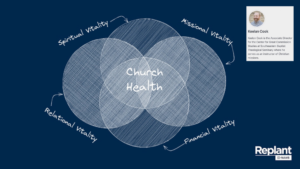Making Sure Busy Doesn’t Equal Burnout
“You need a break. We’re a little concerned that you’re stretching yourself too thin. You just seem really busy and stressed out.” My friend was concerned, and to be honest, I was, too. I was going through our busiest season of ministry and I was so exhausted that I was snapping at my family regularly enough that my kids were walking on eggshells around me. I was mentally, emotionally, and even spiritually drained.
I agreed with my friend that I did absolutely need a break, and I was grateful that they at least acknowledged how hard I was working. But then, in the very next breath, they said, “It would be great though if you could please counsel with my friend– I told her you’d be happy to call her and talk her through some emotional stuff she’s going through.”
Sigh.
Unfortunately, this story isn’t unique. Pastors everywhere are facing jam-packed schedules and struggling under the weight of congregational expectations. Replant pastors are often their church’s pastor, discipleship leader, janitor, maintenance man, events coordinator, interior designer, and communications director. With all these jobs and more, there simply aren’t enough hours in the day!
In 2021, a study conducted by Soul Shepherding, a Christian leadership training ministry, found 75% of pastors reported feeling extreme stress, 90% reported feeling extreme fatigue, 90% were working an average of 55-75 hours per week, and 85% had never had the opportunity to take extended time off.
With those statistics in mind, the latest episode of the Replant Bootcamp podcast sought to give pastors some tips to prevent our busyness from leading to burnout.
The Truth About Being Busy

We are wired to enjoy being needed– and as a pastor, you are definitely needed! Usually by everyone, all at once! But there is a danger in finding your satisfaction in being needed: eventually, you make yourself so necessary that you can never take a break.
Here is a fun fact about work– our brains are also wired to find accomplishing tasks rewarding. Recent studies have proven that your brain releases dopamine when you achieve goals, and that checking off a “to-do” list can make you feel happier.
There are two problems in this, as Bob pointed out. First, sometimes we allow ourselves to love the ministry that we have for Christ more than we are loving Christ. Second, as Jimbo says, ministry never ends– there is always another meeting, someone in the hospital, someone’s house you need to visit, some marriage that needs counseling, a committee that needs to be met with, or a contractor that has to be negotiated with for your AC or your copier lease. Then, of course, you always need to get a weekly sermon prepared. (Whew.)
If the ministry is never “done,” then we never get that rush of dopamine from checking things off. Instead, we just keep feeding the ministry beast– but it’s a monster that is never satisfied. And if you aren’t careful, you will feed your own ego, as well.
Another truth about our busy schedules is that we don’t always allow ourselves to have a proper “Rest Day.” For us, Sunday is a work day. It may be a “day of rest,” for many of our congregation members, but for us, it’s Game Day. It’s the day we show up early, stay late, and preach the Gospel in between.
The command to honor the Sabbath and keep it holy wasn’t about making sure you went to church and then napped. It is a command from our creator to rest– not because He needed it, but because we do. God knew we needed time to reset our minds and to refocus on Him. He knew this about us because He created this need in us! When we get so busy that we neglect the Sabbath, we operate outside of God’s will and His power.
Too Busy or Too Distracted?
Here’s the thing– many times, when we’re busy, it isn’t because we are doing everything God has called us to do. Some of us have lists of ministries, activities, and tasks that aren’t ours to do. Either we have taken on someone else’s responsibilities or we have placed too much emphasis on our own abilities.
Take a look at your life– where are you feeling the most stress? The most anxiety? What task feels like it’s taking more time than you can possibly give? Is this something that God called you to do? Sometimes we forget that while, yes, God called us into ministry, He never asked us to do every part. We forget that He said we are all one body, but different parts, and instead we try to take on every single role in the church. This is a trap of Satan– if we get busy enough, we get stressed, then burnt out, and then distracted. We take our eyes off the goal of loving God and loving people and start to focus on working for God and working for people.
Sometimes it’s not that it’s someone else’s responsibility, but their expectation. Frequently, pastors are approached by people who really feel their church needs a specific ministry or a specific event. These are good projects, and pastors may agree they are needed. But when asked about who will lead it, typically members will say, “Well, not me. I just had the idea. Can’t you lead it or head it up or find someone else to do it?” Their expectation is that we have the time and energy to lead every single thing at the church. In reality, God most likely called them to that ministry. He gave them the vision and he impressed it upon their heart.
When we take on someone else’s expectations of what we should be doing, we shortchange God’s work in their lives, while simultaneously creating unnecessary stress on our own. We feel this pressure to make sure they know we’re working hard. We want our members to see that our car is always in the parking lot, that we are the first to arrive and the last to leave, and that we are always in the office (never mind the fact that so much of ministry happens outside of normal office hours). We feel like being present at every event and every meeting somehow secures our job and makes us seem like the hardest worker in the room.
But here is a hard truth: You’re not God. You aren’t omnipresent. You can’t be everywhere, all the time. The faster you operate knowing that you aren’t capable of doing it all, and the quicker you remind other people of that, the better your schedule looks.
Before You Burn Out

Now that we’ve diagnosed why we’re busy, what can we do about it? Should we just quit everything and become sloths? Tempting, but no.
First, you need to set a sane work schedule. Look at everything you do in a week– literally everything. How much of your time is spent in sermon prep? Bible study? Personal time with God? Kids sporting events? Date night with your spouse? Now start recognizing what is important versus what is urgent. A recent podcast and blog can help you identify those terms better to help you make that decision.
Next, focus your work according to your wiring. You are naturally geared toward specific schedules and productivity times. I am not a morning person– I don’t come alive until after the coffee is in my system and my body is sufficiently awake, usually around 10 am. I am super productive until about 2 pm, then I eat lunch. Typically I have an afternoon slump after lunch but pick back up around 4 and stay powered up until 9 pm. If I schedule an intense meeting at 8:00 am and pencil in my bible study at 3 pm, it’s a recipe for disaster.
Look at your rhythms of productivity and schedule accordingly. When are you most creative? When is a good time for administration related tasks that require less brainpower? When are you at your best physically for those tasks that require more physical strength?
I am also an introvert. I know if I have “peopled” too much for too long, I will eventually run out of power in my social meter. I have to remember to schedule myself appropriately and leave time for me to recharge so I don’t grow weary of socialization.
Now, delegate and elevate. Those people who thought of a great ministry activity and expected you to lead it? Empower them! Allow them the grace to find their footing and lead it themselves. They may make a mistake– that’s OK. You can train them and release them much easier that you can try to do everything yourself. Is there something you’re doing that falls under the description of a committee, elder, or deacon responsibility? Delegate it. They have a job God has called them to do; it’s time for them to do it.
And last, but certainly not least— remember to pencil in time with Jesus at the top of your list. He calls us to come to Him and receive rest when we are weary (Matthew 11:28). Before you burn out completely, start making it a priority to come to Him. Meditate on His words, not just for sermon preparation, but for your own personal time with Him. Allow Him to show you areas of weakness and areas where your ego may be leading instead of Him. Take time to talk to Him, but make sure you include time to listen, too. Jesus longs to bring rest to your exhausted soul– let Him.
Resources for the Busy Pastor

Many of the applications we mentioned in this podcast and the accompanying blog are tips we’ve learned from our friend, Jordan Raynor. Jordan’s book, Redeeming Your Time, has reshaped and changed our schedules for the better and we highly recommend it.
Right now, Jordan is offering Bootcamp listeners a discount for his online course where you will learn the principles Jordan teaches on how to make your work more productive and more meaningful. The course is normally $249, but Bootcamp listeners can sign up for only $49 using the discount code “JImbo.” Email us to connect with Jordan’s online course.
We also have the Replant Summit coming up in exactly one month. If you haven’t registered for it, please do so now! The theme this year is “Renew” and we are excited to meet each of you and spend time with one another.
As always, if digital marketing is taking up too much of your time, our friends at 180 Digital are happy to help. Contact them and see what resources they have to make your life a little easier!


 The pressure of ministry can sometimes feel insurmountable. In the
The pressure of ministry can sometimes feel insurmountable. In the 
 If our church hurt comes from a verbal exchange, it’s best to go to that church member and say, “My brother, I’m not sure you realized that when you said _________, I felt like you were saying ___________. This was hurtful to me.” I wonder how many times we would see the grace of reconciled relationships, if we simply tamed our tongues and went directly to the source of the conflict.
If our church hurt comes from a verbal exchange, it’s best to go to that church member and say, “My brother, I’m not sure you realized that when you said _________, I felt like you were saying ___________. This was hurtful to me.” I wonder how many times we would see the grace of reconciled relationships, if we simply tamed our tongues and went directly to the source of the conflict. 

 In a normal career, our performance is evaluated by the work we are able to accomplish. When I was in the landscaping field, my work was evaluated on the efficiency and quality of my work. But ministry should be seen differently. That’s because in kingdom work, we are not the ones who give growth to the body, and the business does not belong to us. Our “company” has one founder and one CEO, Jesus Christ. He is the one that gives fruit and gets the glory for any fruit that is produced. Our job is simply to steward and care for what he has entrusted to us.
In a normal career, our performance is evaluated by the work we are able to accomplish. When I was in the landscaping field, my work was evaluated on the efficiency and quality of my work. But ministry should be seen differently. That’s because in kingdom work, we are not the ones who give growth to the body, and the business does not belong to us. Our “company” has one founder and one CEO, Jesus Christ. He is the one that gives fruit and gets the glory for any fruit that is produced. Our job is simply to steward and care for what he has entrusted to us.
 The grass may be greener on another side, but that grass withers as well. If things get tough, don’t begin looking at the job board so quickly. Instead, get on your knees before God and began seeking Him. If He called us, He will sustain us. Let us look to Him.
The grass may be greener on another side, but that grass withers as well. If things get tough, don’t begin looking at the job board so quickly. Instead, get on your knees before God and began seeking Him. If He called us, He will sustain us. Let us look to Him.

 One of the best tools you can use is Google calendar or something similar. Every time I create a task, I get reminders throughout the day, both through my phone and email. Not all pastors or leaders have the privilege of having a secretary that manages calendar dates. Make sure when you work with your calendar you schedule time to rest, and schedule time for people who are close to you. As ministry leaders, we should be excellent stewards of our time, so schedule out your calendar with wisdom and consistency.
One of the best tools you can use is Google calendar or something similar. Every time I create a task, I get reminders throughout the day, both through my phone and email. Not all pastors or leaders have the privilege of having a secretary that manages calendar dates. Make sure when you work with your calendar you schedule time to rest, and schedule time for people who are close to you. As ministry leaders, we should be excellent stewards of our time, so schedule out your calendar with wisdom and consistency. If we aren’t taking a day to replenish and rest, we will become quickly exhausted, and wear out in this ministry. Taking a Sabbath means taking a day or a significant amount of time to restore your soul. And since God created rest and modeled rest, he will give us the strength to rest when we need.
If we aren’t taking a day to replenish and rest, we will become quickly exhausted, and wear out in this ministry. Taking a Sabbath means taking a day or a significant amount of time to restore your soul. And since God created rest and modeled rest, he will give us the strength to rest when we need.


 Like the author is describing, we all have this race that is set before us, and God has called us for his glory to be about his great Kingdom work! Now, it takes
Like the author is describing, we all have this race that is set before us, and God has called us for his glory to be about his great Kingdom work! Now, it takes 






 average person 7 times hearing the gospel before a conversion. It takes the average church replant
average person 7 times hearing the gospel before a conversion. It takes the average church replant






